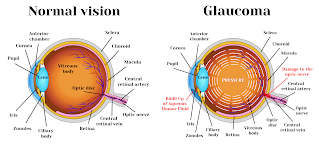Glaucoma: Causes, Symptoms, and Homeopathy Treatment
Glaucoma is a condition that affects the eyes and can lead to permanent vision loss. It is caused by an increase in intraocular pressure, which can damage the optic nerve over time. Glaucoma is often referred to as the "silent thief of sight" because it can progress slowly and without noticeable symptoms until it is too late. In this post, we will explore the causes, symptoms, and treatment options for glaucoma, with a particular focus on homeopathy. We will also discuss the suggested potencies for those who are new to homeopathy.
What is Glaucoma?
Glaucoma is a group of eye diseases that cause damage to the optic nerve. The optic nerve is responsible for carrying visual information from the eye to the brain, and if it is damaged, it can lead to permanent vision loss. The most common type of glaucoma is primary open-angle glaucoma, which affects over 3 million people in the United States. Other types of glaucoma include angle-closure glaucoma and normal-tension glaucoma.
Causes of Glaucoma
The most common cause of glaucoma is an increase in intraocular pressure. This can occur when the fluid that circulates through the eye, called aqueous humor, does not drain properly. As a result, the pressure inside the eye increases, which can damage the optic nerve over time. Other factors that may increase the risk of developing glaucoma include age, family history, certain medical conditions such as diabetes, and long-term use of corticosteroids.
Symptoms of Glaucoma
In the early stages of glaucoma, there are usually no noticeable symptoms. As the condition progresses, however, the following symptoms may occur:
1;Loss of peripheral vision
2:Blurred vision
3:Eye pain
4:Halos around lights
5:Redness in the eye
It is important to note that these symptoms can also be associated with other eye conditions, so it is important to see an eye doctor for a proper diagnosis.
Homeopathy Treatment for Glaucoma
Homeopathy is a natural form of medicine that can be used to treat a wide range of health conditions, including glaucoma. Homeopathy remedies are made from natural substances such as plants, minerals, and animal sources, and they are highly diluted to stimulate the body's natural healing mechanisms.
Below are some of the most common homeopathy remedies used to treat glaucoma:
1:Physostigma: This remedy is often used to treat glaucoma that is associated with a feeling of tightness around the eyes. It may also be helpful for glaucoma that is accompanied by twitching or spasms of the eyelids. The recommended potency for Physostigma is 6C to 30C.
2:Gelsemium: Gelsemium is a plant-based remedy that is often used to treat glaucoma that is associated with a feeling of heaviness in the eyes. It may also be beneficial for glaucoma that is accompanied by blurred vision or headaches. The recommended potency for Gelsemium is 6C to 30C.
4:Ruta: Ruta is a plant-based remedy that is often used to treat eye-related conditions such as glaucoma. It may be helpful for glaucoma that is accompanied by eye strain or tiredness. The recommended potency for Ruta is 6C to 30C.
5:Phosphorus: Phosphorus is a mineral-based remedy that is often used to treat eye conditions such as glaucoma. It may be beneficial for glaucoma that is accompanied by vision loss or dimness. The recommended potency for Phosphorus is 6C
CINERARIA MARITIMA:-
- THIS MEDICINE IS MADE BY GERMANY ITS RESULT IS 100% USE 2DROPS IN EACH EYES
- OTHERS pharma make it not 100% i think becuse i have not get thire results 100 % like this and others pharma!
- But i have a lot of expiriance in homeopathic medicine as matriamedica & thire symptoms and Glaucoma anatomy pathalogy points who use in homeopathy and homeopathy philosphy
Homeopathy uses natural ingredients from either plants, minerals or animals in a highly diluted form. The concept is that "like cure like", meaning that substances in nature taken in whole form can cause or mimic certain health problems, but taken in extremely diluted form help the body heal from those same problems-
Gelsemium: Often palliates the severe pain and seemingly exercises a curative influence on the neurotic character of the disease. Orbital neuralgia with contraction and twitching of muscles. Bruised pain back of orbit. Eye lids heavy. 10 a.m. aggravation and headach migrine etc
- One day I was in a Bus then I was student in my computer class time i met a young student he was my new classfellow he was suffring in glaucoma begining his symptoms was eyes red swellings and eyes were so bad in vision .Affter my class he comes with me and talking about his eyes .I take his casetaking and find the medicine these below
Belladona 30c and Spigelia 30c
He cures fastly i pickup the many notes
I pickup this tow principle that in acutes cases "gelsimium 30 and osimum can 30 " In chronic use single medicine











Comments
Post a Comment